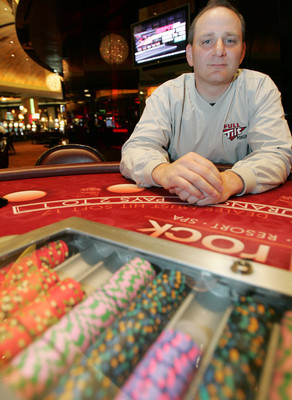Las Vegan part of team featured in new movie
Professional poker player Andy Bloch holds two engineering degrees from the Massachusetts Institute of Technology and a law degree from Harvard University.
His real education, however, took place miles from the classroom.
Bloch, 38, a Summerlin resident who is a fixture on the tournament poker circuit, teamed up with several of his MIT classmates in the 1990s and took casinos in Las Vegas and around the country for millions of dollars through a systematic card-counting operation.
The team's exploits were detailed in the book, "Bringing Down the House," a 2002 New York Times best-seller by Ben Mezrich. The story reaches the big screen today with the release of "21," which is based on the book and stars two-time Academy Award winner Kevin Spacey.
Bloch wasn't involved in the making of the movie or the book. He tells people most of the characters in the book are composites of several different people.
"You can't pick me out," he said.
Through a friend, Bloch was able to attend the movie's premiere at Planet Hollywood Resort two weeks ago. He wrote a review for his Web site.
"I've got a lot of mixed emotions about the movie," Bloch said during an interview at Red Rock Resort, where portions of the movie were shot.
"It's exciting to see something you were involved with for such a long period of time become a major motion picture," Bloch said. "At the same time, I would have liked to have been more involved (with the movie). I think some of the people on the team would agree with that."
Bloch said "Bringing Down the House" contained elements of an accurate story but took several fictional liberties. The movie, he said, was a fictionalized account of the book. He said there are a few minor inaccuracies in the movie that only a blackjack player or an MIT student would notice.
He was a little disappointed, however, that some of the code words and hand signals the blackjack team members used during the card counting activities were revealed in both the book and movie.
"I'm not playing blackjack much anymore, but there are some people from the team still out there making money at blackjack," Bloch said.
Bloch spent six years on the MIT blackjack team, joining after graduating from the university. He met one of the team's originators, who brought him into the fold, in a poker game.
"Unlike most student activities, it was sort of an unofficial student activity," Bloch said. "You did have to be 21 in order to participate."
Bloch kept the team's books for several years, tracking the results of some 50 to 100 players. He said a "conservative estimate" showed the team winning $10 million. During his time, teams would split and players would come and go.
"The core group had maybe a dozen players on each team, which changed over the years," Bloch said. "Some people might play one weekend every few months and others might have played for a year or two, then disappeared."
Some of the fun for team members was coming up with fake identifications or disguises. Once, before heading to a blackjack excursion in Biloxi, Miss., Bloch bought a Texas A&M baseball cap and tried to come off as an "Aggie," which was a tough challenge due to his heavy East Coast accent.
Bloch was arrested once for card counting in Monte Carlo, "the municipality, not the casino." He was also chased out of several casinos for card counting. Other members of the team "got roughed up a bit."
One of his most profitable weekends at blackjack took place in October 1996 during the opening of the Mohegan Sun casino in Uncasville, Conn. Bloch, who was in his first year of law school, won enough money that weekend to pay for his Harvard education.
When the team walked into the Mohegan Sun, they spotted members of a rival MIT blackjack team.
"We were worried they would kill (the casino) before we really had a chance," Bloch said. "But then they decided to take off and go watch the (New England) Patriots play. That was good because they left the casino wide open for us, and we crushed it."
As a poker professional, Bloch has won more than $3.2 million in tournament play. He recently finished second in the National Heads-Up Poker Championship at Caesars Palace that was filmed for broadcast in April by NBC. Bloch won $250,000, losing in the finals to 2000 World Series of Poker Champion Chris "Jesus" Ferguson.
At the World Series of Poker in 2006, Bloch scored his highest poker payday, winning more than $1 million for his second place finish in the tournament's first $50,000 buy-in H.O.R.S.E. event. Bloch went head-to-head with eventual champion Chip Reese for almost eight hours.
Poker has been much more lucrative that blackjack, he said.
"I don't play blackjack anymore because I don't want to get into trouble where I play poker," Bloch said. "I get recognized pretty easily. The first time I went to Wynn Las Vegas after the casino opened, one of the managers saw me and said, 'Andy, the poker room is that way. You're welcome to play here, just not blackjack.' "
Contact reporter Howard Stutz at hstutz@reviewjournal.com or (702) 477-3871.
RELATED STORIES It Was in the CardsMelodramatic '21' fails to quit while it's ahead























